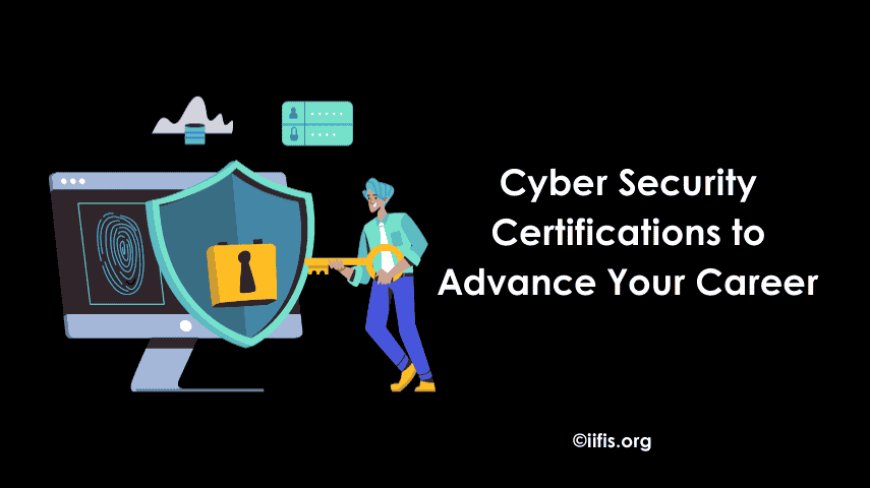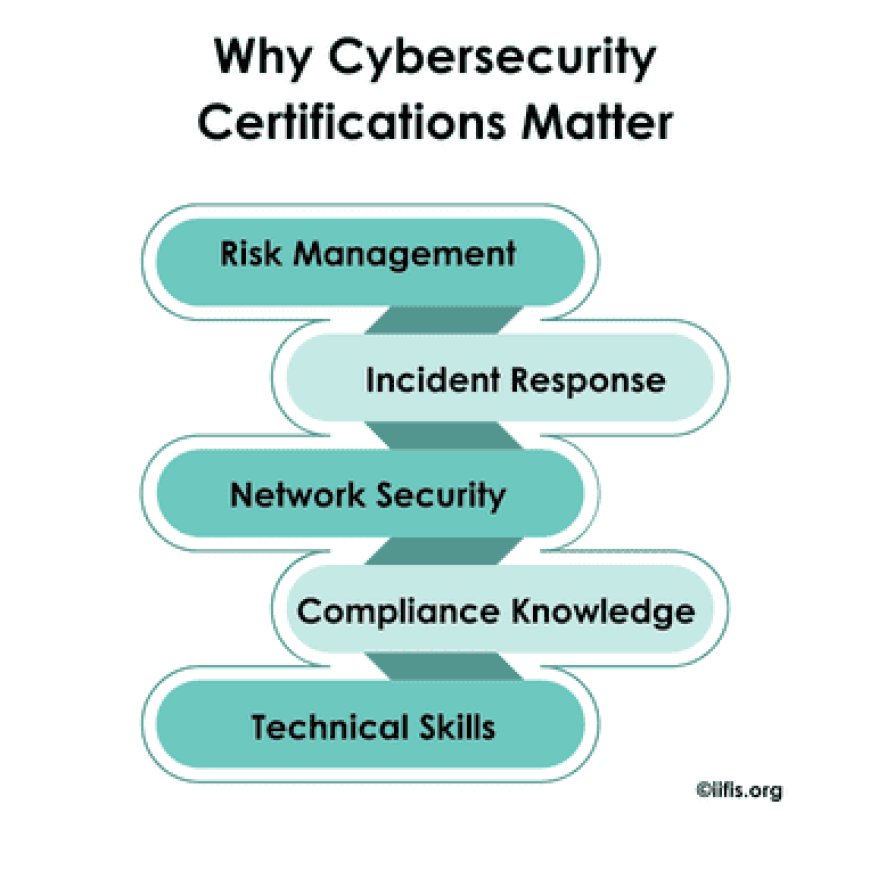Cyber Security Certifications to Advance Your Career
Discover how cyber security certifications can elevate your career by enhancing your credibility, improving job prospects, and equipping you with essential skills. Explore top certification options and tips for success in this dynamic field.

The importance of cyber security cannot be excessive. With increasing threats to data integrity and privacy, organizations are on the lookout for skilled professionals who can protect their assets. Pursuing cyber security certifications is one of the most effective ways to advance your career in this dynamic field. These certifications not only improve your technical skills but also demonstrate your commitment to potential employers. Whether you’re a seasoned IT professional or just starting your journey, obtaining the right certifications can significantly boost your credibility and open doors to new opportunities. In this blog, we’ll explore the top cyber security certifications that can help you elevate your career and make a meaningful impact in the industry.
Importance of Cybersecurity
In today's digital world, cybersecurity has become paramount as organizations increasingly rely on technology for operations, communication, and data storage. The surge in cyber threats—from data breaches to ransomware attacks—highlights the critical need forstrong security measures to protect sensitive information and maintain consumer trust. As businesses shift to remote work and digital platforms, the attack surface expands, making effective cybersecurity strategies essential for protecting assets and ensuring compliance with regulations.
The demand for cybersecurity professionals is rapidly growing, improved by the increasing frequency and competence of cyberattacks. Organizations across all sectors are seeking skilled individuals who can identify weakness, respond to incidents, and implement preventive measures. Certifications play a vital role in this world, as they validate expertise andimprove the credibility of cybersecurity professionals. Credentials such as Certified Information Systems Security Professional (CISSP) and Certified Ethical Hacker (CEH) are highly regarded, equipping individuals with the necessary skills to meet the evolving challenges in cybersecurity. As a result, pursuing certifications not only opens up career opportunities but also contributes significantly to strengthening the overall security posture of organizations.
Why Cybersecurity Certifications Matter
Enhancing Credibility and Job Prospects
Cybersecurity certifications are essential for establishing credibility in a competitive job market. They demonstrate to employers that candidates have recognized skills and knowledge, making them more attractive hires. With increasing cyber threats, certified professionals are prioritized by organizations looking to strengthen their security teams.
Skills and Knowledge Gained Through Certification Programs
Certification programs equip professionals with vital skills, including:
-
Risk Management: Assessing and mitigating information system risks.
-
Incident Response: Effectively handling security breaches.
-
Network Security: Securing networks against unauthorized access.
-
Compliance Knowledge: Understanding data protection laws.
-
Technical Skills: Hands-on experience with cybersecurity tools and technologies.

Cybersecurity certifications improve a professional's resume and prepare them to tackle the evolving challenges in the field.
Key Cybersecurity Certifications
-
CompTIA Security+
-
Overview and Target Audience: An entry-level certification ideal for those starting in cybersecurity, covering foundational concepts.
-
Key Skills Covered: Network security, threat management, cryptography, and risk assessment.
-
Overview and Requirements: A globally recognized certification requiring five years of work experience in cybersecurity and a deep understanding of security principles.
-
Importance for Experienced Professionals: Demonstrates advanced knowledge, making it crucial for roles in security management and architecture.
-
Overview and Focus on Ethical Hacking: Focuses on understanding and exploiting vulnerabilities from an ethical standpoint.
-
Relevance in Today’s Threat Landscape: Equips professionals to think like attackers, crucial for defending against modern cyber threats.
-
Overview and Managerial Focus: Designed for professionals managing, designing, and overseeing an enterprise’s information security.
-
Benefits for Career Advancement: Enhances managerial skills and opens doors to leadership positions in cybersecurity.
-
Overview and Relevance to Auditing and Compliance: Focuses on auditing, controlling, and ensuring compliance of information systems.
-
Importance for IT Governance: Critical for professionals involved in IT governance, risk management, and compliance auditing.
Choosing the Right Certification for Your Career Path
Factors to Consider
-
Career Goals: Define your long-term objectives. Are you aiming for a specific role, such as a security analyst or a manager? Certifications should align with these aspirations.
-
Current Skill Level: Assess your existing knowledge and experience. Entry-level certifications like CompTIA Security+ are suitable for beginners, while advanced certifications like CISSP are ideal for seasoned professionals.
-
Industry Demand: Research the current job market in your area or desired field. Look for certifications that are highly sought after in your industry, ensuring they will enhance your employability.
Tips for Selecting Certifications
-
Align with Interests: Choose certifications that resonate with your personal interests within cybersecurity, whether it’s ethical hacking, risk management, or auditing.
-
Evaluate Program Content: Review the curriculum of potential certifications to ensure they cover topics that are relevant to your career goals and interests.
-
Consider Learning Formats: Think about your preferred learning style—online courses, in-person classes, or self-paced study—and select a certification that offers the right format for you.
-
Seek Recommendations: Consult industry professionals, mentors, or career advisors for insights into which certifications can best support your career path.
-
Look for Continuing Education Opportunities: Choose certifications that encourage ongoing learning and offer pathways for further specialization, keeping you competitive in the evolving cyber security world.
Preparing for Cybersecurity Certification Exams
Study Resources and Materials
-
Books: Use recommended texts, such as "CompTIA Security+ All-in-One Exam Guide" for Security+ or "CISSP Official Study Guide" for CISSP.
-
Practice Exams: Utilize practice tests from resources like MeasureUp and Modifications to familiarize yourself with exam formats.
-
Study Groups: Join forums or local groups to discuss topics and share resources with peers.
Tips for Effective Study Habits and Exam Preparation Strategies
-
Create a Study Schedule: Dedicate regular study times leading up to the exam.
-
Break Down Topics: Focus on mastering one section of the exam content at a time.
-
Use Active Learning: Engage with the material through note-taking and teaching concepts.
-
Practice Regularly: Take timed practice exams to simulate the test environment and identify weak areas.
-
Stay Healthy: Maintain a balanced diet, exercise, and get enough sleep for optimal cognitive function.
-
Review and Adjust: Assess progress and adjust your study plan as needed to focus on areas of concern.
By Using these resources and strategies, you'll improve your preparation for cybersecurity certification exams.
The Impact of Certifications on Career Growth
Real-Life Examples of Career Advancement
Certifications can significantly propel professionals in their careers. For Example, an IT professional who earned the Certified Information Systems Security Professional (CISSP) certification transitioned from a security analyst role to a senior security manager position within a year. Similarly, a cybersecurity engineer with a Certified Ethical Hacker (CEH) credential reported increased responsibilities and leadership opportunities, ultimately landing a role as a cybersecurity consultant for a major corporation.
Potential Salary Increases and Job Opportunities
Certifications often lead to substantial salary increases. According to industry surveys, professionals with certifications like CISSP can earn up to 25% more than their non-certified colleagues. Certifications also enhance job opportunities, with many employers listing them as preferred or required qualifications in job postings. This trend is particularly evident in cybersecurity, where the demand for certified professionals continues to rise due to increasing threats.
Obtaining relevant certifications can lead to meaningful career advancements, increased earning potential, and access to a wider range of job opportunities in the cybersecurity field.
Cybersecurity certifications are important for building your professional credibility and advancing your career. They help validate your skills and can lead to new job opportunities and higher salaries.
I encourage you to pursue certifications that match your career goals. The International Institute for Information Security (IIFIS) offers valuable training and certification programs to help you succeed in the cybersecurity field. Investing in your education through IIFIS can give you the skills you need to thrive in this growing industry.
























